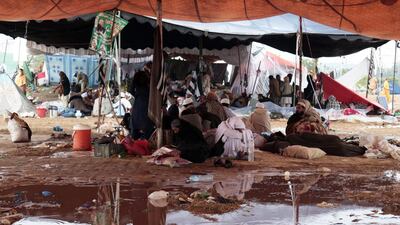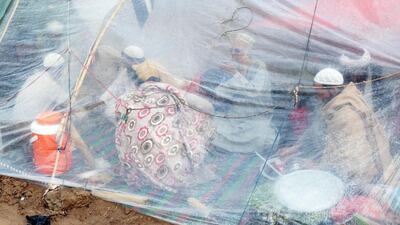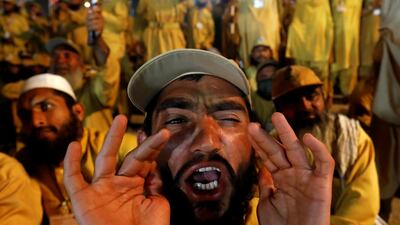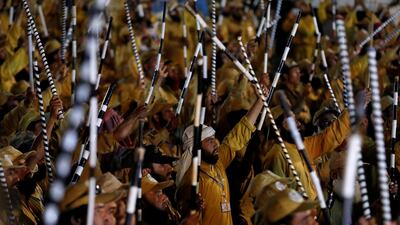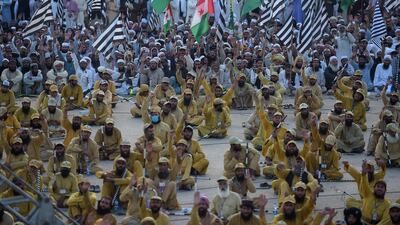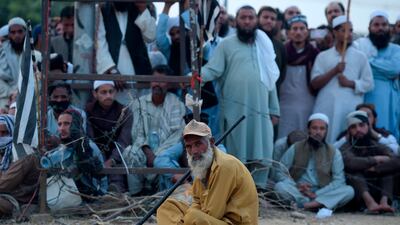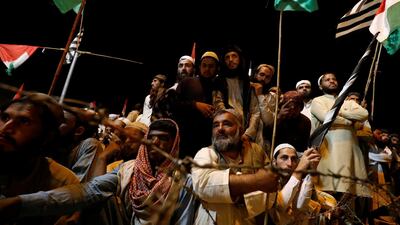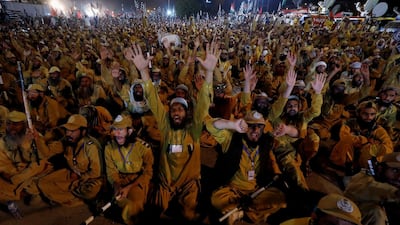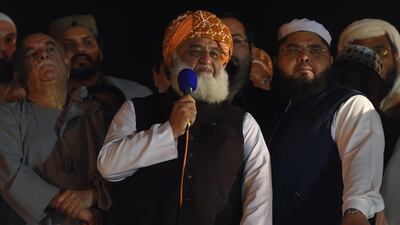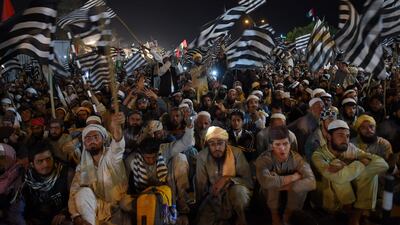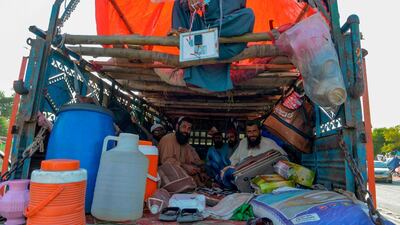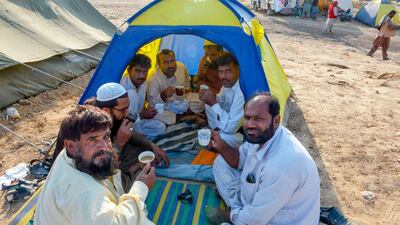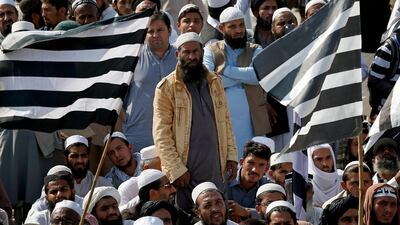Nearly a week after as many as 50,000 people descended on Pakistan's capital to demand the removal of Prime Minister Imran Khan, both he and the protestors are still there.
What began as a march led by the hardline Islamist Jamiat Ulema-e-Islam (JUI-F) party has now become a sit-in while the party leader flexes his political muscle and negotiates with the government and opposition.
Each night for the past week, Mullah Fazlur Rehman has made a speech to the crowd denouncing Mr Khan's government, saying it was ushered in with military help after a rigged election and they are ruining the country.
Then, each day he holds talks with the government and fellow opposition parties demanding Mr Khan steps down and new elections are held.
In the meantime, the protestors wait and on Wednesday braved heavy rain.
“We will stay as long as the mullah orders us to stay,” said Shah Nawaz, a madrassah teacher from Balochistan.
The sheer number of people mobilised by Mr Rehman from seminaries and party networks has created the first significant political challenge to Mr Khan since he rose to power 16 months ago.
Thousands of police reinforcements have been drafted in and main roads to the district housing parliament and government ministries have been sealed with shipping containers. The display of party political power has also enlivened an opposition that had appeared fractured and subdued under a barrage of anti-corruption investigations that have locked up many of its leaders.
The encampment on the side of an Islamabad highway, around five miles from the country's parliament, is disciplined and well organised. Protestors arrived in convoys of buses and minivans complete with bedding, tents and supplies. A force of khaki-clad volunteers keep order. Among the crowds passing the time praying, chatting and playing games, their gripes are a mixture of political, economic and religious. Anger at the election result mixes with frustration at galloping price rises and an economic slump.
“I am here to demolish this government. It's a fake government,” said Saleh Mohammad, a farmer from the poor province of Balochistan who had arrived with around a dozen friends.
Fayzan Rehman, a 32-year-old small businessman from the capital, said he had come to join in because he was “fed up with what has been going on for the last year-and-a-half”.
“Business has declined. If you see my worksheet for the past five years, I was in profit and for the past six months, my income is almost zero.
“The level of commitment I have seen and the mood of the people is rising. For me, it has become a movement. Whether they achieve their goal or not, they have exposed the government.”
Other complaints among the faithful of the right-wing party are more hardline religious. Several alleged Mr Khan was a Jewish agent, or bemoaned the release of Asia Bibi, the Christian farmhand who fled abroad earlier this year when her death penalty was quashed after she was falsely accused of blasphemy.
Mr Rehman at first gave Mr Khan a 48-hour ultimatum to quit. The prime minister unsurprisingly refused and the deadline passed unheeded. The larger opposition groups have also been lukewarm in their support for his sit-in. Mr Khan's special adviser on information and broadcasting, Firdous Ashiq Awan, on Wednesday called Mr Rehman "politically isolated".
"Mullah should step out of self-deception and [stop] bothering the public. You have failed in [your] scheme. Do not attack the democratic process and insult the public mandate like the others who were rejected in the general elections," she said.
Yet the very size of the JUI-F mobilisation and has nevertheless forced Mr Khan's government to have several days of negotiations with Mr Rehman. By Wednesday, they were still deadlocked.
Mr Rehman's demand for the prime minister's resignation has been rejected, but Defence Minister Pervez Khattak, who is leading the government’s negotiation team, has said he is “still hopeful of finding a middle ground”.
Such middle ground could potentially include promises to reform the election commission and hold the next general election without military involvement, suggested Muhammad Amir Rana, a political and security analyst.
The powerful military appears to still back Mr Khan. A statement from Gen Qamar Javed Bajwa, chief of the army staff, earlier this week said no one would be allowed to undermine stability.
As Daud Jan, an Islamabad hospital worker, wandered around the site out of curiosity, he predicted the show of people power would ultimately not dislodge Mr Khan.
“Sure, it's a big number, but it's not dangerous for Imran Khan's government. People still believe in him.”
But the display could potentially embolden the bigger opposition parties to challenge Mr Khan themselves in the coming months, suggested Mr Rana.
“Fazlur Rehman may not be the main beneficiary in all this,” he predicted.

